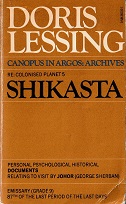Review of 'Shikasta'
Shikasta by Doris Lessing
1st book in the 'Canopus in Argos: Archives' series
 Or, more correctly, “Re: Colonised Planet 5; Shikasta; Personal Psychological Historical Documents Relating to Visit by Johor (George Sherban); Emissary (Grade 9); 87th of the Last Period of the Last Days”. Yeah, it is a bit odd.
Or, more correctly, “Re: Colonised Planet 5; Shikasta; Personal Psychological Historical Documents Relating to Visit by Johor (George Sherban); Emissary (Grade 9); 87th of the Last Period of the Last Days”. Yeah, it is a bit odd.
“Shikasta” tells the story of our planet from the perspective of Johor, an alien being from Canopus who returns to earth again and again (much like many of his species and others) on a mission to save it's inhabitants from their self-destructive ways. The novel begins with the retraction of alien resources supporting the planet that results in the extinction of the servile “giants”, wide-spread discussion and descent into anarchy despite Johor's best efforts at instilling a moral centre to the remaining population. We then move onto the events of the 20th century as seen through a series of reports from various operatives including Johor, now known as “George Sherban” who is uniting the youth of the world to build it anew following the first and second world wars. He works against the evil influence of another alien species, the Shammat, who wish nothing less than the destruction of the civilisation so desired by Canopus.
I have to admit it took the second try at reading this for me to actually complete it. It is difficult to follow and get into in the first half when it is not entirely clear that the planet they are discussing in somewhat abstract ways is actually Earth. Getting to grips with what exactly is going on and the “logic” of this setting takes some time but when this becomes clear and we enter the 20th century I found it much easier to follow. Though tempting it might be to descend into rhetoric and criticism in “Shikasta” Lessing remains quite neutral in reporting of the events on the planet using multiple perspectives and narratives to provide a diverse perspective though it is obvious, particularly in the later part of the novel that she most definitely believes that it is intrinsic in our nature to destroy ourselves (the “Trial” hosted by the youth army is between the whites and the rest of the world, which features, as you might expect, much acrimony yet concludes in a refreshingly honest way).
An interesting if somewhat dry and bleak socio-economic commentary on the whole of humanity leaving little room for optimism. Difficult to read but definitely imaginative and occasionally witty if not actually at any point actually amusing. Not a narrative in the traditional sense but more a chronicle of humanity told from an outsider's perspective. Can't say I will be picking it up again any time soon nor is it likely I will even read any of the subsequent books in this series of five.
Rating: “It is OK but I have some issues”
Review Date: 2020-05-08
Genre: Science Fiction
Publisher: Granada
Publication Date: 1979
ISBN: 0586053107